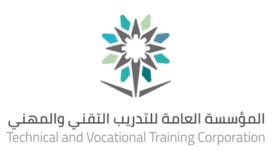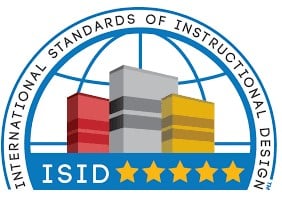

Training bag: Crisis and problem management course and effective decision-making


™IMAS
ضمن مفاهيم تصميم الأنظمة المنهجية في التدريب، تأتي مصفوفة IMAS كأداة من أدوات صناعة التدريب المعاصرة، والتي تتعامل مع آلية تجميع عناصر الحقيبة التدريبية في شكل متكامل ومتماسك لضمان توافق هذه العناصر مع تحقيق أهداف التدريب ورفع كفاءة الأداء مشارك ومدرب ومنظم. إنه يمكّن المطور من تطوير سيناريو تدريب احترافي مدروس جيدًا وإدارة وقت الجلسة التدريبية. يمكن للجلسة معالجة أي موضوع.

المؤسسة العامة للتدريب التقني والمهني
صممت منهجية خاصة بالجودة الداخلية في الوحدات التدريبية التابعة لها، حيث تشمل على خمسة معايير رئيسية، تتضمن الإدارة والقيادة، والمدربين، والخدمات المقدمة للمتدربين، والمناهج، وبيئة التدريب، وذلك بهدف تطوير جودة التدريب المقدم في المنشآت التدريبية لمواكبة حاجة سوق العمل المحلي.

™ISID
يعد أول برنامج من نوعه في تقييم وتصنيف الحقائب التدريبية ويهدف إلى أن يكون مرجعاً مهماً للشركات والمؤسسات لضمان جودة التدريب المقدم لكوادرها من أجل تطوير الأداء وتطويره وتحسينه. إن جعل هذه المعايير دولية ليس فقط لأنها منتشرة في أكثر من قارة واحدة ومئات البلدان والمنظمات، ولكن أيضًا لأنها متوافقة مع العديد. تقنيات أسترالية ويابانية وكندية وأمريكية.

™IMAS
ضمن مفاهيم تصميم الأنظمة المنهجية في التدريب، تأتي مصفوفة IMAS كأداة من أدوات صناعة التدريب المعاصرة، والتي تتعامل مع آلية تجميع عناصر الحقيبة التدريبية في شكل متكامل ومتماسك لضمان توافق هذه العناصر مع تحقيق أهداف التدريب ورفع كفاءة الأداء مشارك ومدرب ومنظم. إنه يمكّن المطور من تطوير سيناريو تدريب احترافي مدروس جيدًا وإدارة وقت الجلسة التدريبية. يمكن للجلسة معالجة أي موضوع.

المؤسسة العامة للتدريب التقني والمهني
صممت منهجية خاصة بالجودة الداخلية في الوحدات التدريبية التابعة لها، حيث تشمل على خمسة معايير رئيسية، تتضمن الإدارة والقيادة، والمدربين، والخدمات المقدمة للمتدربين، والمناهج، وبيئة التدريب، وذلك بهدف تطوير جودة التدريب المقدم في المنشآت التدريبية لمواكبة حاجة سوق العمل المحلي.

™ISID
يعد أول برنامج من نوعه في تقييم وتصنيف الحقائب التدريبية ويهدف إلى أن يكون مرجعاً مهماً للشركات والمؤسسات لضمان جودة التدريب المقدم لكوادرها من أجل تطوير الأداء وتطويره وتحسينه. إن جعل هذه المعايير دولية ليس فقط لأنها منتشرة في أكثر من قارة واحدة ومئات البلدان والمنظمات، ولكن أيضًا لأنها متوافقة مع العديد. تقنيات أسترالية ويابانية وكندية وأمريكية.
There are no reviews yet.
Only logged in customers who have purchased this product may leave a review.

ضمن مفاهيم تصميم الأنظمة المنهجية في التدريب ،تأتي مصفوفة IMAS كأداة من أدوات صناعة التدريب المعاصرة ،والتي تتعامل مع آلية تجميع عناصر الحقيبة التدريبية في شكل متكامل ومتماسك لضمان توافق هذه العناصر مع تحقيق أهداف التدريب ورفع كفاءة الأداء مشارك ومدرب ومنظم. إنه يمكّن المطور من تطوير سيناريو تدريب احترافي مدروس جيدًا وإدارة وقت الجلسة التدريبية. يمكن للجلسة معالجة أي موضوع.

صممت منهجية خاصة بالجودة الداخلية في الوحدات التدريبية التابعة لها، حيث تشمل على خمسة معايير رئيسية، تتضمن الإدارة والقيادة، والمدربين، والخدمات المقدمة للمتدربين، والمناهج، وبيئة التدريب، وذلك بهدف تطوير جودة التدريب المقدم في المنشآت التدريبية لمواكبة حاجة سوق العمل المحلي.

يعد أول برنامع من نوعه في تقييم وتصنيف الحقائب التدريبية،ويهدف إلى أن يكون مرجعاً مهماً للشركات والمؤسسات لضمان جودة التدريب المقدم لكوادرها من أجل تطوير الأداء وتطويره وتحسينه. إن جعل هذه المعايير دولية ليس فقط لأنها منتشرة في أكثر من قارة واحدة ومئات البلدان والمنظمات ،ولكن أيضًا لأنها متوافقة مع العديد. تقنيات أسترالية ويابانية وكندية وأمريكية.
There are no reviews yet.
Only logged in customers who have purchased this product may leave a review.









Training bag: Crisis and problem management course and effective decision-making

™IMAS
ضمن مفاهيم تصميم الأنظمة المنهجية في التدريب، تأتي مصفوفة IMAS كأداة من أدوات صناعة التدريب المعاصرة، والتي تتعامل مع آلية تجميع عناصر الحقيبة التدريبية في شكل متكامل ومتماسك لضمان توافق هذه العناصر مع تحقيق أهداف التدريب ورفع كفاءة الأداء مشارك ومدرب ومنظم. إنه يمكّن المطور من تطوير سيناريو تدريب احترافي مدروس جيدًا وإدارة وقت الجلسة التدريبية. يمكن للجلسة معالجة أي موضوع.

المؤسسة العامة للتدريب التقني والمهني
صممت منهجية خاصة بالجودة الداخلية في الوحدات التدريبية التابعة لها، حيث تشمل على خمسة معايير رئيسية، تتضمن الإدارة والقيادة، والمدربين، والخدمات المقدمة للمتدربين، والمناهج، وبيئة التدريب، وذلك بهدف تطوير جودة التدريب المقدم في المنشآت التدريبية لمواكبة حاجة سوق العمل المحلي.

™ISID
يعد أول برنامج من نوعه في تقييم وتصنيف الحقائب التدريبية ويهدف إلى أن يكون مرجعاً مهماً للشركات والمؤسسات لضمان جودة التدريب المقدم لكوادرها من أجل تطوير الأداء وتطويره وتحسينه. إن جعل هذه المعايير دولية ليس فقط لأنها منتشرة في أكثر من قارة واحدة ومئات البلدان والمنظمات، ولكن أيضًا لأنها متوافقة مع العديد. تقنيات أسترالية ويابانية وكندية وأمريكية.
There are no reviews yet.
Only logged in customers who have purchased this product may leave a review.

™IMAS
ضمن مفاهيم تصميم الأنظمة المنهجية في التدريب، تأتي مصفوفة IMAS كأداة من أدوات صناعة التدريب المعاصرة، والتي تتعامل مع آلية تجميع عناصر الحقيبة التدريبية في شكل متكامل ومتماسك لضمان توافق هذه العناصر مع تحقيق أهداف التدريب ورفع كفاءة الأداء مشارك ومدرب ومنظم. إنه يمكّن المطور من تطوير سيناريو تدريب احترافي مدروس جيدًا وإدارة وقت الجلسة التدريبية. يمكن للجلسة معالجة أي موضوع.

المؤسسة العامة للتدريب التقني والمهني
صممت منهجية خاصة بالجودة الداخلية في الوحدات التدريبية التابعة لها، حيث تشمل على خمسة معايير رئيسية، تتضمن الإدارة والقيادة، والمدربين، والخدمات المقدمة للمتدربين، والمناهج، وبيئة التدريب، وذلك بهدف تطوير جودة التدريب المقدم في المنشآت التدريبية لمواكبة حاجة سوق العمل المحلي.

™ISID
يعد أول برنامج من نوعه في تقييم وتصنيف الحقائب التدريبية ويهدف إلى أن يكون مرجعاً مهماً للشركات والمؤسسات لضمان جودة التدريب المقدم لكوادرها من أجل تطوير الأداء وتطويره وتحسينه. إن جعل هذه المعايير دولية ليس فقط لأنها منتشرة في أكثر من قارة واحدة ومئات البلدان والمنظمات، ولكن أيضًا لأنها متوافقة مع العديد. تقنيات أسترالية ويابانية وكندية وأمريكية.
There are no reviews yet.
Only logged in customers who have purchased this product may leave a review.

ضمن مفاهيم تصميم الأنظمة المنهجية في التدريب ،تأتي مصفوفة IMAS كأداة من أدوات صناعة التدريب المعاصرة ،والتي تتعامل مع آلية تجميع عناصر الحقيبة التدريبية في شكل متكامل ومتماسك لضمان توافق هذه العناصر مع تحقيق أهداف التدريب ورفع كفاءة الأداء مشارك ومدرب ومنظم. إنه يمكّن المطور من تطوير سيناريو تدريب احترافي مدروس جيدًا وإدارة وقت الجلسة التدريبية. يمكن للجلسة معالجة أي موضوع.

صممت منهجية خاصة بالجودة الداخلية في الوحدات التدريبية التابعة لها، حيث تشمل على خمسة معايير رئيسية، تتضمن الإدارة والقيادة، والمدربين، والخدمات المقدمة للمتدربين، والمناهج، وبيئة التدريب، وذلك بهدف تطوير جودة التدريب المقدم في المنشآت التدريبية لمواكبة حاجة سوق العمل المحلي.

يعد أول برنامع من نوعه في تقييم وتصنيف الحقائب التدريبية،ويهدف إلى أن يكون مرجعاً مهماً للشركات والمؤسسات لضمان جودة التدريب المقدم لكوادرها من أجل تطوير الأداء وتطويره وتحسينه. إن جعل هذه المعايير دولية ليس فقط لأنها منتشرة في أكثر من قارة واحدة ومئات البلدان والمنظمات ،ولكن أيضًا لأنها متوافقة مع العديد. تقنيات أسترالية ويابانية وكندية وأمريكية.
There are no reviews yet.
Only logged in customers who have purchased this product may leave a review.






Training bag: Make your mark and create amazing graphic designs
Training bag: Step-by-step course to write your novel
Training bag: How to implement architectural finishes
This training material is designed to equip beginners and experienced professionals with the essential business skills and knowledge they need to succeed. Covering fundamental concepts such as finance, marketing, operations, and management, this training material provides a comprehensive foundation for individuals looking to enhance their business acumen and drive growth in their organizations.
This training material covers the topic of macroeconomics with a focus on the 2023 budgets and the USA economy. It includes information on government macroeconomic policies, as well as workbooks and multiple-choice tests to reinforce learning and assess understanding. Perfect for anyone looking to enhance their knowledge in macroeconomics and stay updated on the latest economic trends.
This training material provides a comprehensive understanding of generational differences and cultural diversity in India, focusing on effective management and leadership strategies. It also explores the impact of cultural diversity on industrial organizational strategy. With 20 hours of content, it equips participants with the knowledge and skills to navigate diverse workplaces in India and develop successful strategies for organizational growth and success.
This training material focuses on crisis management in the context of a pandemic, specifically addressing the economic response. It covers strategies and techniques for effectively managing the financial impact of a crisis, including government policies, business continuity planning, and financial risk management.
The Oxford Diploma in Business Fundamentals training material includes comprehensive content on essential business concepts and practices. The package also provides multiple-choice tests to measure knowledge acquisition and workbooks for practical application of concepts. Perfect for individuals seeking a comprehensive understanding of business fundamentals and preparing for professional certifications.
This training material is designed to help individuals prepare for the Entry Certification in Business Analysis exam. It provides practice exams that simulate the real exam experience, allowing participants to assess their knowledge and understanding of key concepts in business analysis. The material covers a wide range of topics, including requirements elicitation, stakeholder analysis, and process modeling.
Training bag: Crisis and problem management course and effective decision-making
Reviews
There are no reviews yet.
Only logged in customers who have purchased this product may leave a review.